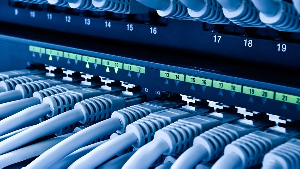The Ministry of Communications and Digitalisation through the World Bank financed eTransform project has significantly made strides in enhancing connectivity across Ghana. This ambitious initiative has revolutionized digital infrastructure, and the potential of ensuring that every corner of the country has access to high-speed internet and modern communication tools.
The eTransform Project is a Government of Ghana initiative which is being funded with World Bank support. Project implementation started in January 2015. The project was restructured by the Ministry of Communications and Digitalisation and the World Bank in January 2018 to re-focus the project for accelerated development objective attainment.
The project development objective is to improve the efficiency and coverage of government service delivery using information and communication technology (ICT).
The eTransform Project, a cornerstone of the Digital Ghana Agenda, focused on several key areas:
Enabling environment for digital Ghana i.e. e-government and business focusing on policy, regulatory, and institutional capacity building to promote electronic services, support innovation centers, and enhance government data management.
Launch and scale-up of priority digital services and applications in priority sectors where ICT would be utilized to improve health and education services and complete key e-applications.
Project Management Support also provides coordination, communication, procurement, financial management, and monitoring to ensure effective project implementation.
Minister of Communications and Digitalisation, Mrs. Ursula Owusu-Ekuful, emphasized the transformative potential of the ongoing connectivity project.
“The eTransform Project is a game-changer for Ghana. By improving connectivity, we are not only enhancing access to information and services but also driving economic growth and social inclusion. This project is a testament to our commitment to building a digital economy that benefits all Ghanaians.” she said.
The eTransform Project is funded by the World Bank and the project which aligned with global efforts to promote digital inclusion and ensure that developing countries can participate fully in the digital economy closes on June 30th, 2024.
Backbone connectivity was extended to 254 District Centers, significantly expanding from the initial 69 centers. This includes crucial systems like the Government Integrated Financial Management Information System (GIFMIS) and the Ghana Revenue Authority’s Tax Revenue Integrated Processing System (TRIPS). Last mile connectivity, the most ambitious part of the project, aimed to serve over 2,000 MDAs across the country.
The government network connectivity (Backbone and last mile), with a minimum of 1Gig capacity has been provided to 951 government institutions across the country on a 10-year indefeasible rights of use (IRU) basis. All the planned sites have been connected, validated, and passed Final Acceptance by NITA.
The eTransform Project continues to enhance the efficiency and coverage of government services through strategic ICT integration, fostering digital inclusion and socio-economic development across the nation.
The Ministry of Communications and Digitalisation in Ghana is actively involved in various projects aimed at improving the country’s digital infrastructure.
Some key initiatives include:
National Broadband Infrastructure: This project aims to expand broadband connectivity across Ghana, particularly in underserved and rural areas. The goal is to ensure widespread access to high-speed internet, which is essential for economic growth and development.
Ghana Rural Telephony and Digital Inclusion Project: This initiative focuses on providing telephony and internet services to rural communities. By building infrastructure and providing necessary tools, the project seeks to bridge the digital divide and enhance digital literacy.
Digital Ghana Agenda: As part of a broader vision, the Digital Ghana Agenda encompasses multiple projects aimed at digitizing various aspects of the economy. This includes e-government services, digital financial services, and fostering innovation in the tech sector.
National Data Center Project: To support the increasing demand for data services and storage, the Ministry has established national data centers. These centers provide a secure and reliable environment for data hosting and management, crucial for both public and private sector needs.
ICT for Accelerated Development (ICT4AD) Policy: This policy framework guides the development and implementation of ICT initiatives in Ghana. It covers areas such as infrastructure development, human resource development, and regulatory frameworks to support a robust ICT ecosystem.
These projects and policies are part of Ghana’s broader strategy to harness the power of technology for socio-economic development, improve public services, and enhance the quality of life for its citizens.
Business News of Thursday, 27 June 2024
Source: thebftonline.com













